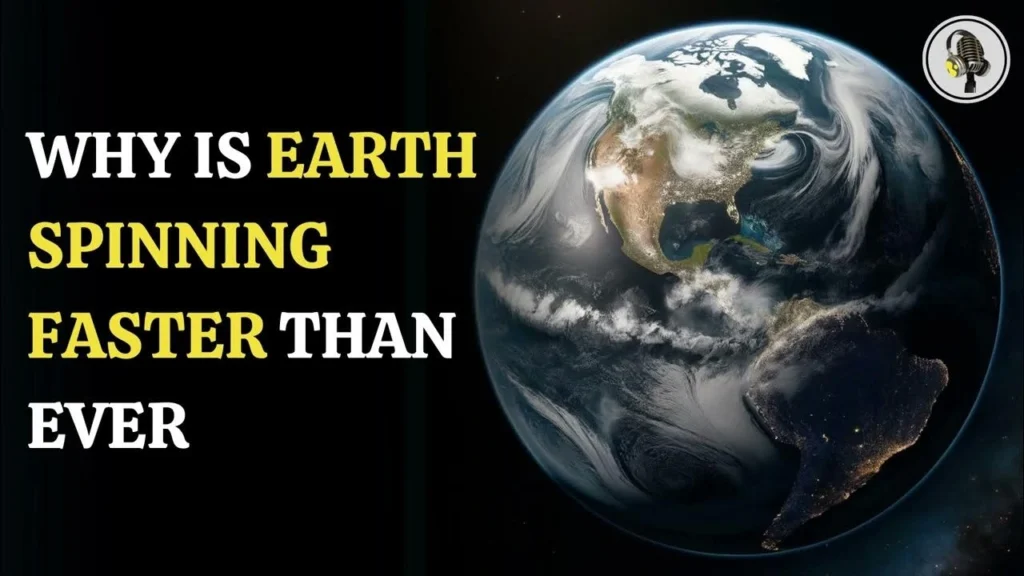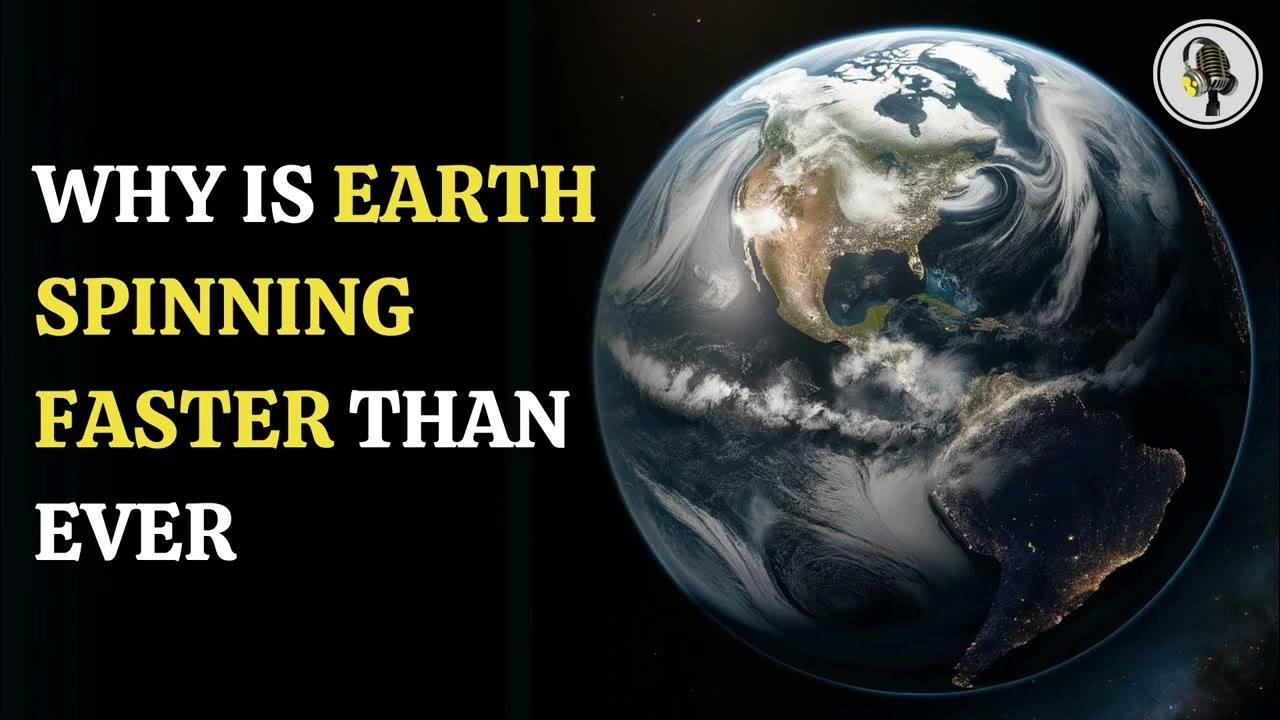Hey there! 👋 Have you ever looked up at the sky and wondered, “Is Earth always spinning at the same speed?” Well, brace yourself because recent observations suggest something unexpected — the Earth might actually be spinning faster than before.
Sounds wild, right? But don’t worry. We’re about to explore this in detail — like two curious friends having a chat over coffee ☕.
So, ready to get nerdy with Earth’s rotation? Let’s roll! (Pun totally intended 😄)

⏳ First, How Fast Does Earth Normally Spin?
Alright, let’s start from the basics.
🌐 Normal Speed of Earth’s Rotation
The Earth spins around its axis at roughly 1,670 kilometers/hour (1,037 miles/hour) at the equator. This rotational speed is what gives us the 24-hour day.
Here’s a quick breakdown:
| Parameter | Value |
|---|---|
| Average speed at equator | 1,670 km/h (1,037 mph) |
| Time to complete 1 rotation | 23 hours, 56 minutes, 4 seconds |
| Type of rotation | West to East (counterclockwise) |
This rotation has been pretty consistent — until recently. Let’s find out what changed.
🧭 So, What’s the Buzz About Earth Spinning Faster?
Here’s where things get spicy 🌶️.
In 2020 and 2021, scientists noticed something strange. The Earth completed its rotations slightly faster than the standard 24 hours. That means — our planet shaved off a few milliseconds from the usual day length.
Yes, milliseconds — but they matter a LOT in global systems like GPS, satellites, and even timekeeping.
📅 Fastest Day Ever?
According to atomic clock data, July 26, 2022, became the shortest day ever recorded since the 1960s.
| Date | Length of Day (shorter by) |
|---|---|
| July 26, 2022 | 1.50 milliseconds |
| July 19, 2020 | 1.46 milliseconds |
| Average 2020 | 28 fastest days on record |
These may seem small numbers, but they signal a curious shift in our Earth’s behavior.
🔍 Why Is Earth Spinning Faster?
Now comes the big question: Why is this happening?
Let’s break it down with possible reasons:
1. Glacial Rebound (Post-Glacial Rebound)
When ice from glaciers melts, it reduces weight from Earth’s crust, causing the mantle to “bounce back.” This shift may affect Earth’s rotation slightly, just like a spinning figure skater pulling their arms in.
2. Chandler Wobble
Sounds fancy? It’s just a small wobble in Earth’s axis. Like a spinning top that slightly wobbles before stopping. This wobble can speed up or slow down Earth’s spin very slightly.
3. Core-Mantle Interaction
The Earth’s core spins at a different rate than the crust. Changes in fluid movement in the outer core could impact the rotational speed.
4. Climate Change & Mass Redistribution
As ice melts and oceans redistribute mass, it affects how Earth spins. Similar to how changing the position of weight on a wheel can change how fast it spins.
🧠 Wait, Should I Be Worried?
Good question. The answer? No need to panic.
These changes are tiny, and you won’t feel anything physically. But yes, for systems like:
- Atomic clocks
- GPS satellites
- Internet servers
- Astronomy instruments
… even a millisecond matters. That’s why scientists are watching this like hawks 🦅.
🧪 How Do Scientists Measure Earth’s Speed?
Great curiosity, my friend!
They use Atomic Clocks and a technique called Very Long Baseline Interferometry (VLBI).
🧭 Tools Used to Measure Earth’s Spin
| Method/Tool | What It Does |
|---|---|
| Atomic Clock | Tracks time with extreme precision (nano accuracy) |
| VLBI | Measures Earth’s rotation by observing quasars |
| Laser Ranging | Measures distances between Earth and satellites |
| GPS Systems | Compare satellite time with Earth’s time |
Fun fact: These clocks are so precise, they won’t lose even 1 second in 100 million years!
⏱️ What’s a Leap Second? And Why It Matters
Here’s where it gets geeky — and interesting.
⌛ Leap Second = A One-Second Adjustment
To keep atomic time and astronomical time in sync, we sometimes add a leap second. This has been happening since 1972.
| Year | Leap Second Added? |
|---|---|
| 2015 | Yes |
| 2016 | Yes |
| 2017–2023 | No |
But now that Earth is spinning faster… wait for it… we might have to subtract a second. That’s called a negative leap second — and it’s never been done before!
Whoa. Time is literally shifting. 🌀
🔧 What If Earth Keeps Spinning Faster?
Let’s get futuristic for a sec ⏩
If this acceleration continues — which scientists say is unlikely long-term — here’s what might happen:
🚀 Possible Impacts
| Area of Life | Impact |
|---|---|
| Global Timekeeping | Negative leap seconds may be introduced |
| Satellite Navigation | GPS systems may need frequent calibration |
| Astronomy | Telescope positions may get affected |
| Internet Servers | Timestamps in computers may get messy |
But again, nothing dramatic like falling off the Earth’s edge. Phew!
🧬 Are Humans Responsible?
Interesting thought.
While natural forces are the primary cause, human activities like:
- Large-scale groundwater extraction
- Deforestation
- Urban construction
- Climate change
… may indirectly contribute by redistributing mass on Earth’s surface.
Imagine Earth like a giant spinning top. Move enough stuff around, and it changes spin — just a little.
📉 But Didn’t Earth Slow Down Before?
Absolutely. Let’s not forget, Earth’s rotation has actually been slowing down over millions of years due to tidal friction caused by the Moon.
That’s why:
- Millions of years ago, a day was only 22 hours long
- Scientists predict future days could be 25+ hours long over millions of years
So, the recent speed-up is like a weird twist in the usual story.
🧭 What Does This Mean for Time & Calendars?
Okay, here’s where things get real.
If Earth keeps spinning faster, and we start removing seconds (negative leap second), it could:
- Cause chaos in computer systems
- Break time-dependent algorithms
- Confuse financial transactions and time logs
In fact, big tech companies like Meta (Facebook) have argued against using leap seconds at all because of the mess it creates.
🛰️ How It Affects You (Yes, You!)
Let’s be honest. You won’t suddenly feel dizzy or fall over because Earth spun faster by 1 millisecond.
But here’s how it may quietly affect our daily lives:
- GPS Navigation: Your phone’s map accuracy relies on precise time
- Streaming Services: Servers depend on time sync
- Stock Trading: Fractions of seconds matter in transactions
- Weather Satellites: May need calibration
Even your Netflix binge has time in the background. Crazy, right?
🤔 So, Is Earth Going to Keep Spinning Faster?
Short answer: We don’t know — yet.
Earth’s rotation is a complex dance of gravity, fluid dynamics, atmospheric pressure, and internal molten movement.
For now:
- The speed-up trend is observed
- It could reverse or stabilize
- Scientists are keeping a close eye
In other words — it’s an ongoing mystery. And we’re all riding on this spinning rock, wondering where it leads.
📚 Conclusion: Earth’s Speed Is a Wake-Up Call
So friend, to wrap it all up —
Yes, Earth has been spinning slightly faster in recent years. It’s not dangerous, but it is fascinating. It makes us realize how interconnected science, technology, and even the fabric of time really are.
👉 Who would’ve thought 1 millisecond could shake up GPS, leap seconds, and internet servers?
So next time you feel like time’s flying — maybe, just maybe — it’s not just your imagination 😄
🧾 FAQ: Quick Answers to Spinning Questions
| Question | Answer |
|---|---|
| Is Earth spinning faster now? | Yes, in recent years Earth has spun slightly faster |
| Should we worry? | No, it’s a natural and very minor shift |
| What’s a leap second? | It’s a 1-second correction to Earth timekeeping |
| What’s the shortest day on record? | July 26, 2022 (1.50 milliseconds shorter) |
| Can humans feel this change? | No, it’s too small to notice physically |
If you enjoyed this article, don’t forget to share it with your curious friends, and bookmark it for updates as scientists reveal more.
Let’s keep spinning — and learning — together!
